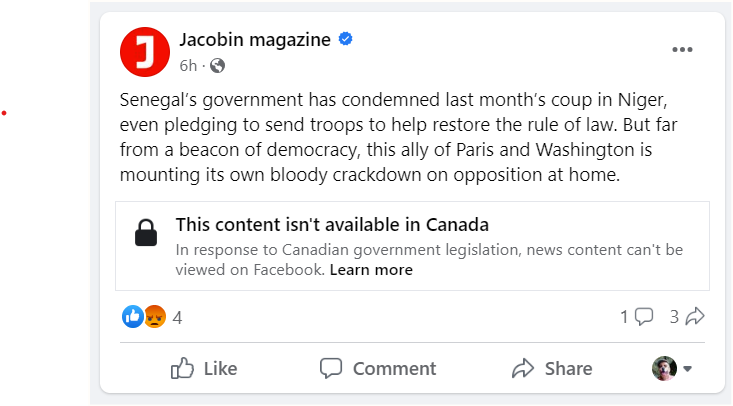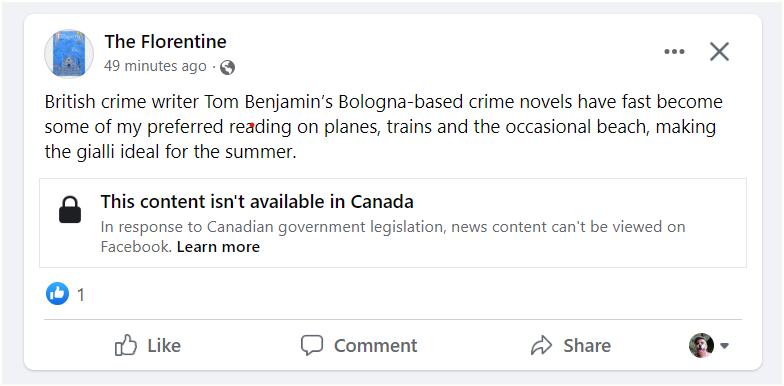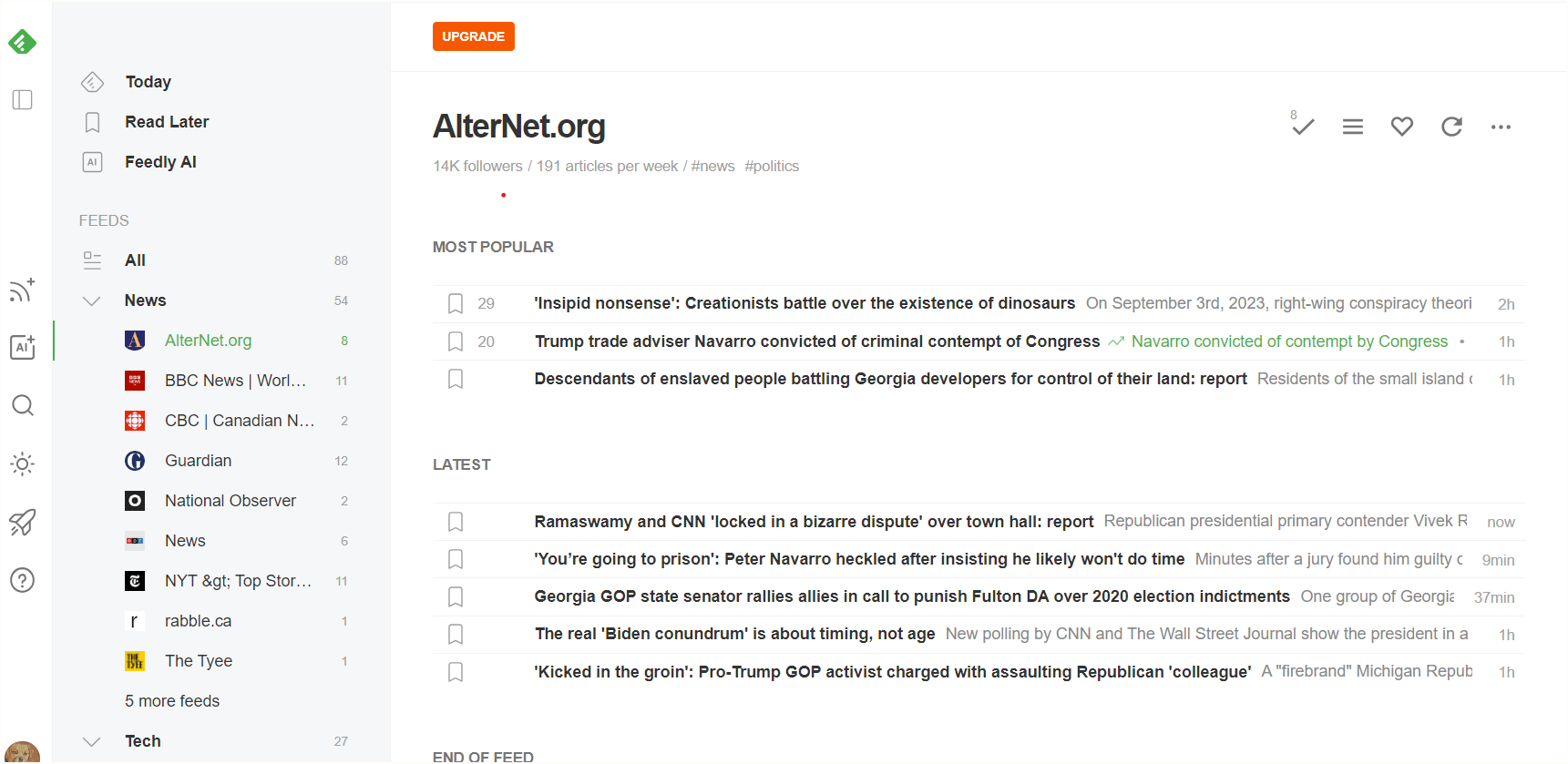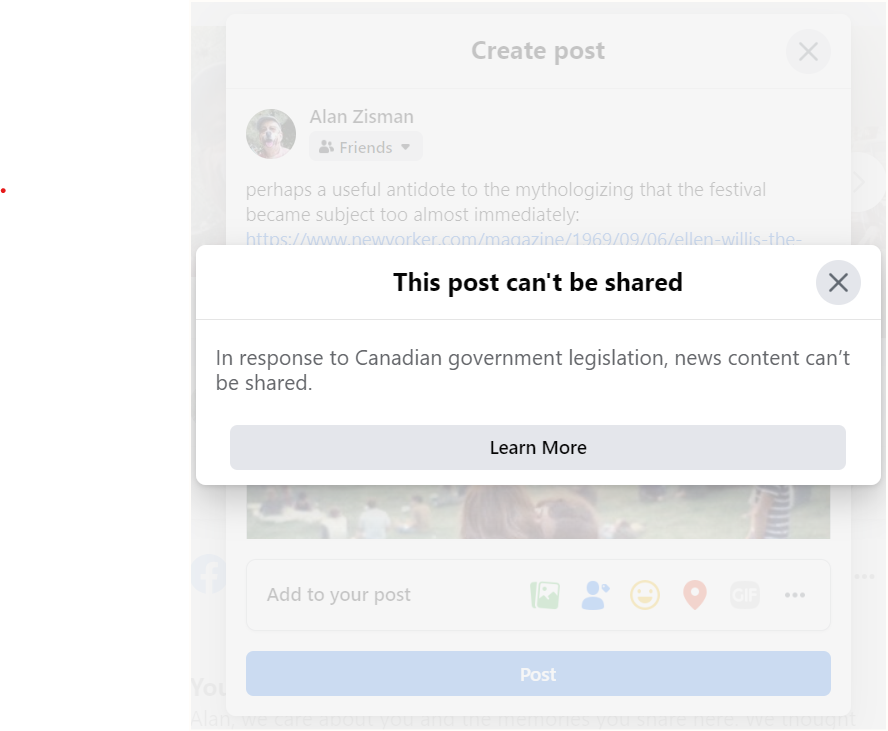ALAN ZISMAN ON
TECHNOLOGY
Facebook declares war on Canada! Read all about it here
By Alan Zisman © 2023-11-29
If you're not a Canadian, you might not have noticed - but if you're a Canadian Facebook (or Instagram) user, you may be feeling like you're collatoral damage.
Pardon me, please, for the clickbait title - but here's the backstory.
Beginning in August 2023, Meta (which owns Facebook, Instagram and WhatsApp) announced that in response to the Canadian government's new Online News Act (aka Bill C-18) it would be removing news from Canadian viewers. (See Meta's announcement here).
Bill C-18, focusing on Meta and Google, required these companies to pay a tax on their Canadian ad revenue - with the tax to be used to fund Canadian news sources, which it was claimed, were losing ad revenue as a result of readers accessing their content through online links. (Note that Bill C-18 did not try to tax Twitter (aka X) or other online sources that might post links to news).
In response, Meta cancelled voluntary payments it was making to Canadian news media, and began blocking links to what its algorithms deemed news articles from appearing in Canadian-users' feeds. Note that it's not just blocking links to articles from Canadian sources, but (more or less) all news - at least when viewed by someone who lives in Canada. (See Meta's post: 'Why can’t I share or view news content on Facebook?'). Google is, reportedly planning to 'pull Canadian news from search' results.
To make more sense of this, consider how I might have been seeing news content on Facebook. (Everything I say about Facebook also applies to Instagram, but I'll just be referring to Facebook here).
I might have 'liked' or 'followed' pages created by news sources, which are used by those news creators to post links to their stories, in print, audio, or video formats. These posts would appear in my Facebook newsfeed.
Some of my Facebook friends might post an article from a news source, including a link to an article that they've read - either reposting someone else's Facebook post or with a link to something they've read or viewed outside of Facebook. Something like "Here are some scary photos of that flooding in New York City..."
In either case, if you're an American or a Pole or a Nigerian, you would be able to view those posts and their links without problem. But if you're a Canadian, you might see something like this:

This post - from American left-wing magazine Jacobin - was able to include the post's text commenting on an article, but the link to the article was blocked.
I don't know what I'd see if I (a Canadian) accessed Facebook while travelling outside Canada - and I don't know what a traveller from outside Canada will see accessing their Facebook account while travelling inside Canada. (If you have experience with either of these, feel free to contact me).
The ban can have its quirks, as Facebook's algorithms decide what is and what isn't a news source. For instance, an article in The Florentine, an English language publication from Florence, about reading murder mysteries ('gialli' in Italian) on the beach during the August holidays was blocked:

But US publication Rolling Stone's articles about US political news seem to be allowed:

Canadian online news sources estimate that they might lose as much as half of their income as a result of this ban. They are trying to get readers who are used to following them on Facebook to go directly to their websites or (better yet) subscribe to their email lists to get links to their new articles directly in their email in-boxes.
Another alternative makes use of an older, largely abandoned Internet protocol - RSS. Standing for 'Really Simple Syndication', RSS was first proposed in 1999 as a standardized way for online news providers to offer links to updates to their sites. Users could use it to follow multiple sites using a news aggregator - either a stand-alone app or a web page. Google, for instance, had a Google Reader service, which worked as an RSS reader, but they cancelled it.
Following the 2013 death of Google Reader, I started using Feedly (https://feedly.com/), once of a number of surviving RSS aggregators. I access it using stand-alone apps on an iPad and an Android phone, and by browsing to their website on my laptop. Once you set up an account, and choose what news sources you want to follow, you can access your personalized RSS feed on any of those devices - seeing the same set of articles no matter how you're accessing it.

With Facebook's ban for Canadian users, I added the Canadian news sources I'd been following in Facbook to my Feedly list - so I still get their new articles, just not in Facebook. And one click to Feedly is far simpler than remembering to check multiple websites, or scrolling through daily emails from multiple news sources.
While I use Feedly, there are other RSS alternatives - BC online news publication The Tyee posted an article titled: Who Needs Meta or Google for News? Use ‘Really Simple Syndication’ - along with an interesting history of the rise and decline of RSS, they recommend The Old Reader.
Whether you use The Old Reader, Feedly, or some other news aggregator, I agree with The Tyee - RSS is perhaps the best way to receive online news articles from multiple sources - especially if you are a Canadian frustrated by Facebook's war.
But there's another dimension to this, that won't be helped if you start to get your news via RSS.
Social media was meant to be, well, social. I appreciate it when one of my Facebook friends posts online with a link to something that they found interesting or informative or even something that really don't like. Now, though, if I'm Canadian, I can read their post, but their link is blocked.
And if I try to share a link to something I think my Facebook friends might find informative, interesting, or thought-provoking, here's what I see:

In this case, I was trying to post a link to a 1969 New Yorker article about the Woodstock Festival - perhaps not exactly 'news' in 2023. While I can receive posts - presumably from non-Canadians - with their commentary, though their links are blocked, as a Canadian I can't even post something similar.
I could post my commentary - and suggest my readers try to find the article on the New Yorker website.... but as soone as I include a link to a 'news article', I am blocked from posting.
For a while, there were ways to get around this. A service called ShareNews.ca quickly started up - paste a link to a news story into a box, and an alternative link is created. Click a button and it's copied to your device's clipboard, ready to paste into a Facebook post. Initially, that worked. Now, it, too, is blocked.
Similarly, links created with so-called URL-shorteners like TinyURL fail.
Some things continue to work. For instance, I can create a post with an edited link to this BBC news article: https://www.bbc.c*m/news/world-us-canada-66977466, telling my readers to replace '.c*m' with '.com' - Facebook posts that, but the result lacks the immediacy of a link that my Facebook friends can just click to read.
Other Facebook friends have gotten into the habit of copying and pasting the entire text of articles they'd like to recommend, resulting in some long Facebook posts.
I don't have any magic solution to recommend... for me, I've mostly given up recommending or sharing articles on Facebook - even in groups that I moderate (and where the readership is mostly non-Canadian). And that's too bad - it makes me less social on social media.
Updates:
(2023-11-28) - Canadian Dimersion post Trudeau interview reveals uncomfortable truth:
The prime minister is either lying about the Online News Act, or he doesn’t understand how the Internet works is worth a read for understanding the issues...
(2023-11-29) - Google agrees to pay publishers in Canada and drops plans for blocking news
Older blog postings....
Facebook declares war on Canada! Read all about it here
By Alan Zisman © 2023-11-29
If you're not a Canadian, you might not have noticed - but if you're a Canadian Facebook (or Instagram) user, you may be feeling like you're collatoral damage.
Pardon me, please, for the clickbait title - but here's the backstory.
Beginning in August 2023, Meta (which owns Facebook, Instagram and WhatsApp) announced that in response to the Canadian government's new Online News Act (aka Bill C-18) it would be removing news from Canadian viewers. (See Meta's announcement here).
Bill C-18, focusing on Meta and Google, required these companies to pay a tax on their Canadian ad revenue - with the tax to be used to fund Canadian news sources, which it was claimed, were losing ad revenue as a result of readers accessing their content through online links. (Note that Bill C-18 did not try to tax Twitter (aka X) or other online sources that might post links to news).
In response, Meta cancelled voluntary payments it was making to Canadian news media, and began blocking links to what its algorithms deemed news articles from appearing in Canadian-users' feeds. Note that it's not just blocking links to articles from Canadian sources, but (more or less) all news - at least when viewed by someone who lives in Canada. (See Meta's post: 'Why can’t I share or view news content on Facebook?'). Google is, reportedly planning to 'pull Canadian news from search' results.
To make more sense of this, consider how I might have been seeing news content on Facebook. (Everything I say about Facebook also applies to Instagram, but I'll just be referring to Facebook here).
I might have 'liked' or 'followed' pages created by news sources, which are used by those news creators to post links to their stories, in print, audio, or video formats. These posts would appear in my Facebook newsfeed.
Some of my Facebook friends might post an article from a news source, including a link to an article that they've read - either reposting someone else's Facebook post or with a link to something they've read or viewed outside of Facebook. Something like "Here are some scary photos of that flooding in New York City..."
In either case, if you're an American or a Pole or a Nigerian, you would be able to view those posts and their links without problem. But if you're a Canadian, you might see something like this:

This post - from American left-wing magazine Jacobin - was able to include the post's text commenting on an article, but the link to the article was blocked.
I don't know what I'd see if I (a Canadian) accessed Facebook while travelling outside Canada - and I don't know what a traveller from outside Canada will see accessing their Facebook account while travelling inside Canada. (If you have experience with either of these, feel free to contact me).
The ban can have its quirks, as Facebook's algorithms decide what is and what isn't a news source. For instance, an article in The Florentine, an English language publication from Florence, about reading murder mysteries ('gialli' in Italian) on the beach during the August holidays was blocked:

But US publication Rolling Stone's articles about US political news seem to be allowed:

Canadian online news sources estimate that they might lose as much as half of their income as a result of this ban. They are trying to get readers who are used to following them on Facebook to go directly to their websites or (better yet) subscribe to their email lists to get links to their new articles directly in their email in-boxes.
Another alternative makes use of an older, largely abandoned Internet protocol - RSS. Standing for 'Really Simple Syndication', RSS was first proposed in 1999 as a standardized way for online news providers to offer links to updates to their sites. Users could use it to follow multiple sites using a news aggregator - either a stand-alone app or a web page. Google, for instance, had a Google Reader service, which worked as an RSS reader, but they cancelled it.
Following the 2013 death of Google Reader, I started using Feedly (https://feedly.com/), once of a number of surviving RSS aggregators. I access it using stand-alone apps on an iPad and an Android phone, and by browsing to their website on my laptop. Once you set up an account, and choose what news sources you want to follow, you can access your personalized RSS feed on any of those devices - seeing the same set of articles no matter how you're accessing it.

With Facebook's ban for Canadian users, I added the Canadian news sources I'd been following in Facbook to my Feedly list - so I still get their new articles, just not in Facebook. And one click to Feedly is far simpler than remembering to check multiple websites, or scrolling through daily emails from multiple news sources.
While I use Feedly, there are other RSS alternatives - BC online news publication The Tyee posted an article titled: Who Needs Meta or Google for News? Use ‘Really Simple Syndication’ - along with an interesting history of the rise and decline of RSS, they recommend The Old Reader.
Whether you use The Old Reader, Feedly, or some other news aggregator, I agree with The Tyee - RSS is perhaps the best way to receive online news articles from multiple sources - especially if you are a Canadian frustrated by Facebook's war.
But there's another dimension to this, that won't be helped if you start to get your news via RSS.
Social media was meant to be, well, social. I appreciate it when one of my Facebook friends posts online with a link to something that they found interesting or informative or even something that really don't like. Now, though, if I'm Canadian, I can read their post, but their link is blocked.
And if I try to share a link to something I think my Facebook friends might find informative, interesting, or thought-provoking, here's what I see:

In this case, I was trying to post a link to a 1969 New Yorker article about the Woodstock Festival - perhaps not exactly 'news' in 2023. While I can receive posts - presumably from non-Canadians - with their commentary, though their links are blocked, as a Canadian I can't even post something similar.
I could post my commentary - and suggest my readers try to find the article on the New Yorker website.... but as soone as I include a link to a 'news article', I am blocked from posting.
For a while, there were ways to get around this. A service called ShareNews.ca quickly started up - paste a link to a news story into a box, and an alternative link is created. Click a button and it's copied to your device's clipboard, ready to paste into a Facebook post. Initially, that worked. Now, it, too, is blocked.
Similarly, links created with so-called URL-shorteners like TinyURL fail.
Some things continue to work. For instance, I can create a post with an edited link to this BBC news article: https://www.bbc.c*m/news/world-us-canada-66977466, telling my readers to replace '.c*m' with '.com' - Facebook posts that, but the result lacks the immediacy of a link that my Facebook friends can just click to read.
Other Facebook friends have gotten into the habit of copying and pasting the entire text of articles they'd like to recommend, resulting in some long Facebook posts.
I don't have any magic solution to recommend... for me, I've mostly given up recommending or sharing articles on Facebook - even in groups that I moderate (and where the readership is mostly non-Canadian). And that's too bad - it makes me less social on social media.
Updates:
(2023-11-28) - Canadian Dimersion post Trudeau interview reveals uncomfortable truth:
The prime minister is either lying about the Online News Act, or he doesn’t understand how the Internet works is worth a read for understanding the issues...
(2023-11-29) - Google agrees to pay publishers in Canada and drops plans for blocking news
Older blog postings....
| About This Blog... I've been writing about computers, software, Internet and the rest of technology since 1992, including a 17 year (1995-2012) stint as 'High Tech Office' columnist for Business in Vancouver. This blog includes thoughts on technology, society, and anything else that might interest me. Comments, emailed to alan@zisman.ca are welcome - and may be published in whole or part. You can follow me on Twitter or Google + for notice of new blog postings. |  |